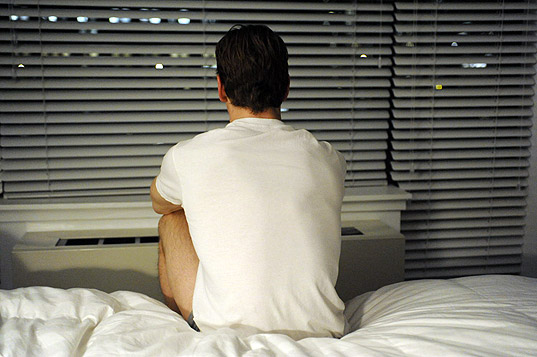Solomon chained.
In 2012, we were given multiple films about slavery, one about its abolition and the other plainly about its utter insanity, in the form of "Lincoln" and "Django Unchained": two films directed by premiere filmmakers Steven Spielberg and Quentin Tarantino. This time, Steve McQueen ("Hunger" and "Shame"), a filmmaker who has steadily established himself throughout the past few years as a potent auteur, brings us "12 Years a Slave": a film that dares to strip 19th century slavery down to its bare essentials and examine the utter savagery that permeates its heart.
Granted, "12 Years a Slave" is not an easy film to watch, as it contains plenty of racially discomforting scenes and is characterized by a sort of brutal realism that would make you feel awfully heavy all throughout. But as cliched as this may sound, this is perhaps one of the most eye-opening films about racism that I've seen. It is visceral, soulful, and even melancholic. It's without politics and gratuitous fantasy violence. It is sans sentimental speeches and a courageous, white man-slapping hero ala Sidney Poitier in "In the Heat of the Night" at its center. It is an ugly 2-hour portrait of racial oppression and inequality, sure, but what makes it even more heart-rending is the tragic character that exists in its core in the form of Solomon Northup, portrayed by Chiwetel Ejiofor with so much nuanced honesty that to just look at his suffering face is already painful enough to do. It's a film that will wrench your guts and twist your bones in anger, but at the same time, it will also move you to tears. Only a handful of films have made me so furious yet very much helpless, and this is definitely one of them.
The cast, comprised mainly of unknown but immensely talented African-American actors (watch out for Dwight Henry and Quvenzhané Wallis of "Beasts of the Southern Wild" fame), have finely taken on the film's somber tone while also being intensely emotional in all the right moments without being overly dramatic. And if Chiwetel Ejiofor's devastating performance as Solomon Northup, a free black man who was tricked into slavery (and who has also written the book from which this was based), was the film's heart and soul, Lupita Nyong'o's empathetic turn as Patsey is its flesh, blood, and bones.
On the other hand, Michael Fassbender, who just never ceases to amaze everyone with his almost unreal acting skills, is pure evil as Edwin Epps, the cotton plantation owner that Solomon and company were unfortunate enough to be sold to. Perennially drunk, ever-amorous, and always armed with a whip and his tendencies to power trip, Epps is the worst kind of slaver (not that I'm saying that there were actually good ones). As crazy as this may sound, countless times have I wished for "Django Unchained's" King Schultz to just magically appear out of nowhere, saunter along Epps' cotton plantation, and just blow his brains out. But then again, this is not how films work. Trust me, though; you will surely have a desire to really rewatch "Django Unchained", what with its not-so-diplomatic way of getting rid of the slave trade, as a sort of natural post-viewing reaction. It's that infuriating a film.
For some, "12 Years a Slave" may come across as a film that desperately asks for pity the same way beggars ask for alms, or perhaps unnaturally incites moral indignation the same way how films about anything remotely biblical upset hardcore believers. But what it is certainly not, for sure, is a film devoid of emotional power. For only 2 hours, the film was able to delineate the violent extent of bigotry, both in action and in words, without resorting to unnecessary discourses about the politics of the situation. The film is assured in its stance about racism, but its power comes not from the white characters' shocking utterances of the 'N' word or from the disturbing scenes involving slaves and whips but from the tranquil scenes of the laborers humming soulfully while harvesting cotton, singing sadly yet defiantly while they bury a dead colleague, and from scenes of them painfully trying to keep their human decency intact even in the face of inhumanity. And if ever the age of slavery has taught us anything, then it is the fact that it never hurts to once in a while look back in retrospect and reflect at things that ultimately matter.
"12 Years a Slave", undoubtedly one of the best films of 2013, is hardly a crash course about the historical scope of slavery, or even a cinematic indictment of all its evils. Looking at it personally, the film is essentially a story of resilience in a time when hope usually gets swatted away by condescending slaps and skin-tearing whiplashes. And kudos to Steve McQueen, who has finally made a relatively mainstream film but was still able to preserve his trademark aesthetics (that unsettling long take when Solomon Northup is hanging on a tree), he has created another film, after "Hunger", that marvels at the strength of the human spirit and makes the pain of proving it seem yet again palpable and all too real.
FINAL RATING





